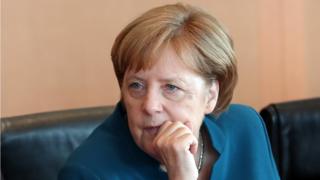Merkel dismisses rumours of party rift
German Chancellor Angela Merkel has dismissed a report that she believes her successor as CDU party leader is not up to the job.
The claim, which she called nonsense, was made by two unidentified officials in a Bloomberg article on Tuesday.
Annegret Kramp-Karrenbauer will take over as leader of the CDU (Christian Democratic Union) next year.
She has been criticised in recent days for suggesting a debate on rules for how “opinion is manufactured” online.
The suggestion was prompted by a viral YouTube video, in which prominent vlogger Rezo accused the government of failing to tackle climate change and income inequality. Dozens of other YouTubers subsequently called on German voters to withhold their votes for the CDU and their coalition partners, the Social Democrats.
At a news conference on Monday, Mrs Kramp-Karrenbauer told reporters: “What would actually happen in this country if, say, 70 newspapers decided just two days before the election to make the joint appeal: ‘Please don’t vote for the CDU and SPD’?”
She later hit back at critics, saying in a tweet that it was “absurd to accuse me of wanting to regulate the expression of opinion”.
Ms Merkel has also defended her comments, saying: “Everyone I know in the CDU is committed to freedom of opinion as a basic principle.”
Despite a jump in voter turnout during Sunday’s European Parliament race, Ms Merkel’s conservative bloc had its worse election result since World War Two. The CDU and its sister party, the Christian Social Union, finished on top but support fell to 28.9% – down more than 7% from the last election four years ago.
The bloc performed especially poorly amongst young voters, taking just 13% of votes by Germans aged under 30.
Who is Annegret Kramp-Karrenbauer?
Popular in Berlin and her home state of Saarland, AKK – as she is known – has a reputation for calm analysis and political acumen.
She joined the party as a student in 1981 and quickly rose up the ranks of state politics, becoming the first woman to serve as a state minister for internal affairs in 2000, and the first woman to serve as prime minister of Saarland.
A Merkel loyalist, she is expected to replicate much of the chancellor’s style and policy.
She has differentiated herself from her mentor, however, by voting in favour of quotas for women on corporate boards and by taking a tougher line on Russia.
She is also more conservative on social issues like gay marriage, and has vowed to review the country’s position on security and migration.
Source: Read Full Article



